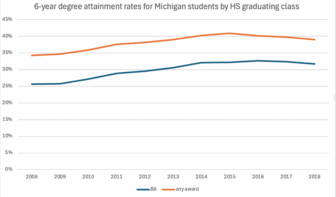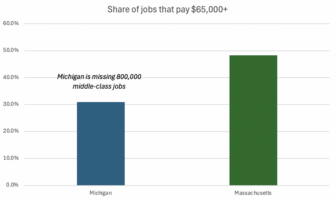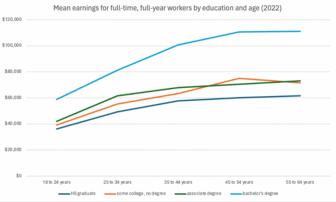![]() At my freshman year college orientation 30 years ago this month, a high-ranking university official asked students to look to their left and to their right and told them that one the fellow freshmen they looked at would likely not finish college. The warning from the university official was meant to inspire students to understand that college is tough and should be taken seriously, but far too often admonitions like these have turned out to be self-fulfilling prophecies.
At my freshman year college orientation 30 years ago this month, a high-ranking university official asked students to look to their left and to their right and told them that one the fellow freshmen they looked at would likely not finish college. The warning from the university official was meant to inspire students to understand that college is tough and should be taken seriously, but far too often admonitions like these have turned out to be self-fulfilling prophecies.
The dirty little secret on college campuses is that many academics are either indifferent to or secretly proud of the fact that large numbers of students wash out. Many professors, deans and even college presidents were trained in academic environments where the typical view was that student failure is a sign of the university’s academic rigor rather than an institutional failure. As a result, even schools that market themselves as universities of opportunity often grapple with lackluster six-year undergraduate graduation rates because marginal students drop out instead of receiving effective interventions.
In Michigan Future Inc.’s first-ever policy report,we urge state leaders to boost funding for higher education in the state and restructure K-12 education to make it relevant to 21st century college and career preparedness. It’s important because we make a compelling case that college degree attainment is increasingly the dominant factor in long-term career success.
And although a college education is the great equalizer in the American economy, too often the definition of what constitutes whether a student is “college material” is fraught with class considerations. According to Paul Tough , who has written extensively and brilliantly about student success, only one-quarter of college freshmen from the lower half of the economic scale will go on to finish a degree. That statistic for children of parents in the top economic quartile? Approximately 90 percent.
The good news is that there is beginning to be a widespread recognition that student success is the most important marker of institutional success in higher education. What good is it to generate amazing research and attract stellar scholars to a campus if students aren’t earning degrees? As a result, many schools are engaging in innovations designed to boost students’ sense of belongingness on college campuses instead of sending messages that some students simply aren’t college material. For example, Tough has written about programs for at-risk disadvantaged students at the University of Texas-Austin designed to leverage data to tailor instruction and boost students’ academic self-esteem.
During a speech at Governor Rick Snyder’s recent State Universities Summit, George L. Mehaffy, vice president for academic leadership and change for the American Association of State Colleges and Universities, lifted up programs like the ones at UT-Austin and encouraged university board members to push for similar innovations on their own campuses. Mehaffy cautioned against small-scale, boutique solutions and pilots, urging university leaders to engage in bold and broad student success initiatives.
At Wayne State University, where I serve as a board member, we have been engaged in a multi-year overhaul of our general education requirements for undergraduate students. We discovered that our math requirement both didn’t serve the numeracy needs of our students and was the number one academic barrier to undergraduate graduation. In his recent speech, Mehaffy said most college algebra is designed to prepare students for calculus but only 10% of college students go on to take calculus. So why, then, does mandating college algebra make sense for all undergraduate students? University leaders need to ask themselves these questions. It’s not about lowering standards. It’s about ensuring that students earn degrees that give them broad knowledge that is presented in a way that is tailored to their academic and career interests.
A few weeks ago, I attended Wayne State University’s student convocation for incoming freshmen and transfer students, and the messages sent by our president, provost, student and academic senate representatives, dean of student affairs and keynote speaker and journalism professor Jack Lessenberry were a dramatic pivot from the dire, threat-filled messages I received as a freshman at Wayne 30 years ago. Instead of telling the students that some of them didn’t belong, speakers at this year’s convocation explained that they wouldn’t have been admitted to Wayne State unless they did. Instead of making students fear failure, the speakers pushed them to embrace the fact that academic challenges are a reality of college life and that they should avail themselves of the network of university resources in place to help them navigate them.
Truthfully, it takes more than pep rallies to boost student success at universities like Wayne State. It takes focused, disciplined leadership from the university administration and board to convey a message that every member of the university community — from faculty to support staff to students themselves — is responsible for student success. We know that there are economic and social benefits to be realized when more Michigan students earn degrees, but there is something bigger at play.
“Here’s a simple argument for student success: It’s the right thing to do,” Mehaffy told Michigan university leaders. “You take students in then, by God, you ought to work hard to make them successful. You have a moral obligation, I would argue.”
As a university board member, it’s my strong belief that once a university sends an incoming student an acceptance letter, they are signing a pact to work with them to help them earn a college degree. This pact must hold for all the students we accept, not only those who were lucky enough to have access to K-12 education that prepared them for academic success at college.







